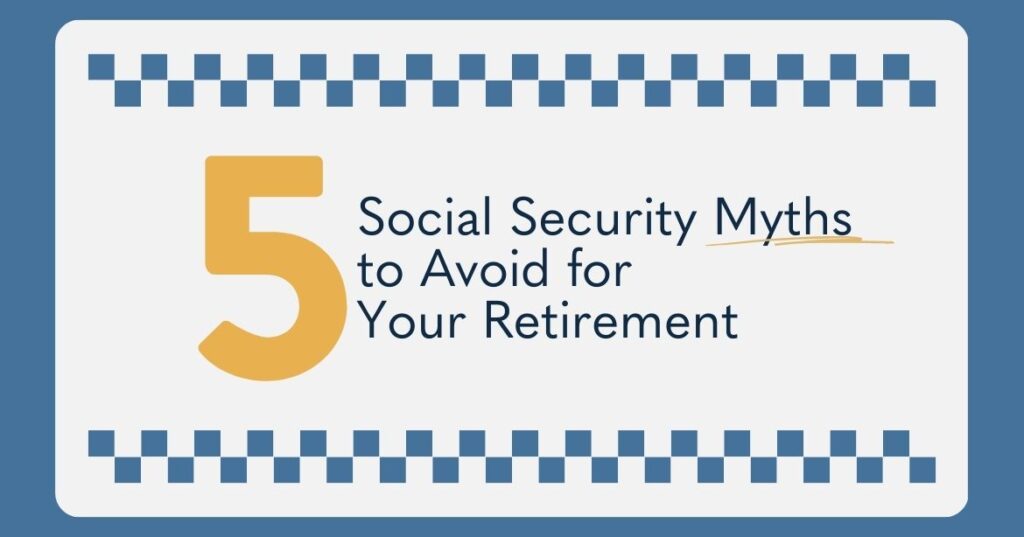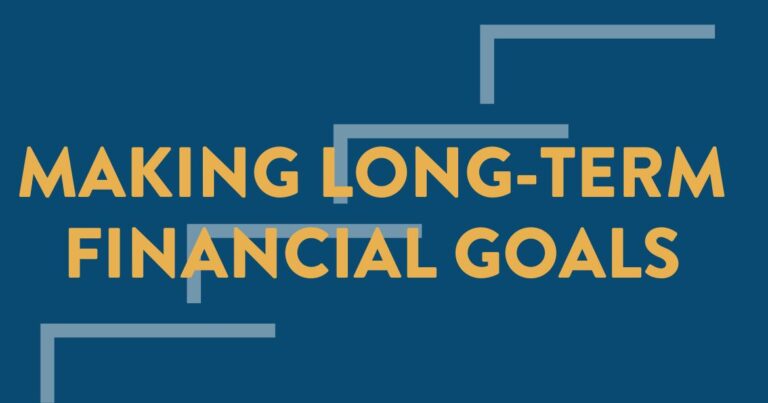Social Security is a critical part of your financial plan. It’s a piece of the foundation (read: not the whole foundation itself) that can make or break your financial independence in retirement. The decision on when and how to claim your benefits is a high-stakes one, especially as complex as Social Security tends to be.
Your claiming strategy has the potential to create consequences, good or bad, for you, your spouse, your dependents, and sometimes even others. Between the 2,600 rules that govern the way Social Security works and the negative headlines about the program’s future, it can be overwhelming trying to find out how to make the right decision for YOU. In this blog, I’ll debunk some of the commonly believed myths about Social Security and give you valuable insights to make informed decisions about your retirement income.
Myth 1: Claiming Early is Best
One prevalent myth is that claiming Social Security benefits as early as possible is the smartest move to maximize your income. And while it’s true that you can begin receiving benefits at age 62, doing so will result in a reduced payout. We tend to call this the “Waffle House method,” and no, we’re not sponsored by or affiliated with Waffle House. This strategy has earned that title because, if you head down the street to the nearest Waffle House, there will likely be a handful of people nearing retirement who will tell you, “Get it while you can! Some money is better than no money! It’s gonna run out before you get a piece of it if you don’t claim now.”
To receive your full retirement benefit, you should wait until your “full retirement age,” which varies depending on your birth year.
- For those born in 1960 or later, the full retirement age is 67.
- Claiming at 62 in this age group results in just 70% of the earned benefits.
- Waiting until your full retirement age gradually increases your benefit to 100%.
- Moreover, delaying beyond your full retirement age provides an 8% benefit boost per year up to age 70.
Contrary to the belief that Social Security may run out of money, history shows that compromises have been made to ensure continued benefits during shortfalls. Politicians like to be re-elected, and retirees vote. Any inaction to save Social Security and replenish the trust fund would likely spell the end of the representative’s time in office. Even still, if no changes are made before the trust fund runs out (projected depletion is 2033), the average retiree will still receive approximately 77 cents on the dollar. A pay cut is certainly not optimal, but it’s not so bleak as if benefits stopped altogether.
Some legislative actions may include raising the retirement age or adjusting Social Security payroll taxes. Nevertheless, the financial benefits of waiting until age 70 can’t be overlooked.
Myth 2: My ‘Break Even’ Age Tells Me When to Claim
Another common concept is to rely on the “break-even” age to determine when to start claiming Social Security benefits. The break-even age signifies the point at which the value of waiting to claim benefits later surpasses the value of claiming early. However, solely focusing on this calculation may lead you to overlook other crucial factors, such as how your claiming decision affects your spouse and dependents or your projected life expectancy.
If your break-even age falls beyond your life expectancy, you may be tempted to claim benefits early. But we don’t have a crystal ball, and betting against longevity by claiming early could leave you without sufficient income in your later years if you end up living longer than expected. Waiting to claim can be seen as purchasing “longevity insurance” from Social Security, ensuring more substantial guaranteed income throughout retirement.
Myth 3: Claiming Now Will Give Me a Cost-of-Living Adjustment
Social Security annually adjusts benefits for inflation through a cost-of-living adjustment (COLA). In 2023, this increase reached a record 8.7%, the highest in four decades, due to surging prices. Some may be tempted to claim benefits immediately to take advantage of this increase… but this is a flawed strategy.
Claiming early doesn’t guarantee a higher COLA. In fact, Social Security adjusts your projected benefits to account for cost-of-living adjustments occurring before your retirement. Waiting to claim won’t deprive you of these adjustments, so it’s often wiser to consider the bigger picture when making your decision.
Myth 4: Social Security Benefits Are Not Taxed
One of the most common misconceptions is that Social Security benefits are not taxed. In reality, benefits are subject to taxation based on a formula called “combined” or “provisional” income. This includes the sum of your adjusted gross income, nontaxable interest, and half of your Social Security benefits. The level of taxation is complicated, and it depends on multiple different factors.
Income thresholds aren’t adjusted for inflation, so more people are exposed to this “stealth tax” on benefits over time. To mitigate this, it’s important to manage your income streams wisely to minimize the tax impact. A financial advisor can help you with forward-looking tax planning.
Myth 5: I Can Make the Best Claiming Decision on My Own
Finally, some individuals believe they can make the best Social Security claiming decision based on the experiences of friends, family, or information from their local Social Security office. While these sources can be helpful for making certain decisions otherwise, they likely won’t be able to provide insights on optimizing your benefits according to your unique circumstances. In fact, those who work at the Social Security Administration aren’t allowed to advise you about your claiming strategy.
It’s important to take the time to understand Social Security rules and how they relate to your financial situation, but you don’t have to become an expert. The Social Security website is a valuable starting point for education. But the best way to get advice specific to your circumstances is to work with a trusted advisor to tailor your strategy to YOUR life.
Let’s face it: claiming Social Security benefits is a pivotal decision that can significantly impact your retirement income. That means it can be extremely daunting. Believing in these myths without doing research as to what works best for you could end up being a costly mistake. Remember that Social Security is a valuable resource designed to help create stability in your foundational income, and with careful planning, you can make the most of this essential benefit and build toward a future of TRUE financial independence.
The opinions voiced in this material are for general information only and are not intended to provide specific advice or recommendations for any individual.




